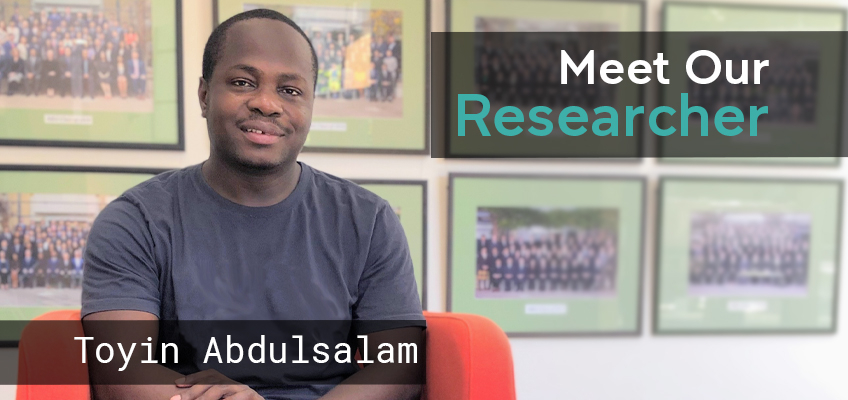02 Mar 2021

Toyin Abdulsalam is a meticulous, results driven researcher with a diverse background. Toyin has a particular interest in NGS data analysis, genomics, statistical genetics and data visualisation and hopes to make a real-world impact by developing methods and frameworks to aid research for delivery. He is currently studying for a PhD in Psychiatry (sponsored by the UNSW Scientia PhD program) with a focus on bioinformatics and particularly using multi-omics data integration strategies to predict age-related phenotypes and longevity.
How did you get into researching the ageing brain?
As a result of my love for computer programming, my research experience began when I commenced a position working as a Research Technician at the Bioinformatics Unit at IITA’s Bioscience Centre. This role allowed me the opportunity to learn various molecular biology techniques while on the job; linking this with my knowledge of programming. Within four years, I had developed a number script-based sequence analysis tools for NGS data analysis used locally for RNA-sequencing, DNA methylation studies (BS-Seq), Chip-Seq, multi-omits data integration and GBS (Genotyping by sequencing) which were used to unravel complex traits in plants (e.g., disease resistance, improved yield and increased nutrients). This was the beginning of my research experience and my passion for the field.
Did you experience a ‘defining moment’ which led you to this field?
The clear defining moment that led me to the field of computational biology was the realisation I wasn’t cut out to be an engineer. I was providing some assistance to a friend - who at the time was an MSc student in bioinformatics - to solve some algorithm problems.
This experience made me fall in love with computational science and I made the choice to move in this direction, which has led me to research of the ageing brain.

Do you have any personal interests or activities which are protective behaviours against cognitive decline?
I have been interested in and participate regularly in a number of activities long before I even realised that they are protective against cognitive decline, including playing chess and scrabble, basketball, football and singing. Complex mental activity as well as regular physical activity are both strong factors for better brain health in late life.
What are you currently researching?
I am currently examining the gap that exists in the knowledge base regarding the functional roles of SNPs; single-nucleotide polymorphisms which are present in a sufficiently large fraction of the population and are related to the genome. I am particularly interested in those SNPs located in non-coding genomic regions, by elucidating how genetic variation potentially contributes to changes in gene expression, protein expression and differentially methylated regions in older adults using a multi-omics approach.
Why is your research important?
The research I am involved in undertaking is significant for a number of reasons. Firstly, few studies have used a multi-omics data integration approach in older adults which ensures we are increasing the evidence base around healthy brain ageing and longevity. Also, as part of this research we propose to develop an online database resource integrating results from our study and other published studies, which can ultimately be useful to examine functionally relevant genetic variants related to complex phenotypes. The output of this research will also make up a rich resource for researchers interested in visualising genetic effects on genes, protein, and methylation.
What do you love about working for CHeBA?
CHeBA accommodates multi-disciplinary researchers which I think is the future of research. Also, I find the researchers within CHeBA all very good role models for upcoming researchers like me.
What is the ultimate hope you have for your research?
I hope my research will make a real-world impact even as I develop methods and frameworks to aid research for delivery that can be used directly in making accurate predictions of age-related phenotypes in clinics and research labs.
This interview was undertaken during the COVID-19 work from home period.
Donations are fundamental for critical research to continue following COVID-19.
If you would like to discuss supporting Toyin Abdulsalam's work specifically, or would like information
on leaving a legacy via a Gift in your Will, please contact h.douglass@unsw.edu.au.

Toyin Abdulsalam is a PhD student supervised by CHeBA Co-Director Professor Perminder Sachdev. His secondary supervisors are CHeBA’s Dr Karen Mather, Dr Anbu Thalamuthu, Dr Anne Poljak and Professor Marc Wilkins with the School of Biotechnology and Biomolecular Sciences. He is sponsored by the UNSW Scientia PhD program. Toyin completed a Bachelor of Agricultural Engineering, an MSc degree in Computer Science with option in Bioinformatics and has over 8 years’ experience in the industry and in research institutions.
